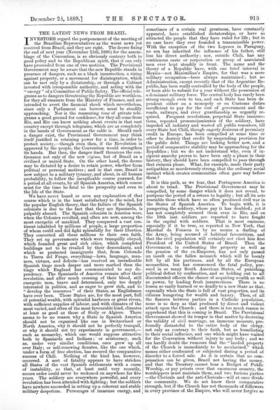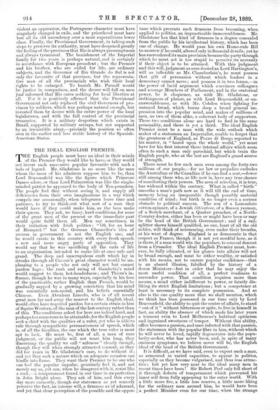111E LATEST NEWS FROM BRAZIL.
INVESTORS regard the postponement of the meeting of the Brazilian Representatives as the worst news yet received from Brazil, and they are right. The decree fixing the end of next year (November 15th, 1890) for the assem- blage of the Convention, is so obviously contrary both to good policy and to the Republican spirit, that it can only have proceeded from one of two motives. The Provisional Government may be aware that the new Republic stands in presence of dangers, such as a black insurrection, a rising against property, or a movement for disintegration, which can be met only by a dictatorship, or through a Cabinet invested with irresponsible authority, and acting with the " energy " of a Committee of Public Safety. The official tele- grams as to dangers threatening the Republic are worthless. for they all emanate from the Ministry of Finance, and are intended to avert the financial shock which nevertheless, since only a Parliament can borrow, must be steadily approaching. Nor is the reassuring tone of private tele- grams a good ground for confidence, for they all come from Rio, and Rio can know nothing about events in that vast country except through telegrams, which are as completely in the hands of Government as the cable is. Should such a danger exist, the Provisional Government may think itself justified in retaining power for a time, in order to protect society,—though even then, if the Revolution is approved by the people, the Convention would strengthen its hands. But then, the danger itself threatens the con- tinuance not only of the new regime, but of Brazil as a civilised or united State. On the other hand, the decree may be dictated by a desire to retain power, whether from political or personal motives ; and in that case, Brazil is now subject to a military tyranny, and about, in all human probability, to follow the inexplicable course pursued, for a period at all events, by all Spanish America, which course must for the time be fatal to the prosperity and even to the life of the State.
We have never heard or seen any explanation of that course which is in the least satisfactory to the mind, for the popular English theory, that the failure of the Spanish colonists is due to the fact that they are Spaniards, is palpably absurd. The Spanish colonists in America were, when the Colonies revolted, and often are now, among the most energetic of mankind. They conquered a vast con- tinent inhabited by millions of people, a large proportion of whom could and did fight splendidly for their liberties. They converted all these millions to their own faith. They set up governments which were tranquilly obeyed, which founded great and rich cities, which completed buildings not to be rivalled by their descendants, and which so protected immigrants that, from Colorado to Tierra del Fuego, everything—laws, language, man- ners, virtues, and defects—has received an ineradicable Spanish tinge much deeper and more marked than the tinge which England has communicated to any de- pendency. The Spaniards of America remain after their revolution, and after much crossing of their blood, still energetic men, brave and determined, only too deeply interested in politics, and as eager to grow rich, and to " develop the resources " of their States, as Englishmen have ever been. 'Those States are, for the most part, full of potential wealth, with splendid harbours or great rivers, with sufficient supplies of labour, and with climates of the most varied, and often of the most favourable kind, climates at least as good as those of Sicily or Algiers. There seems to be no reason why a State in Spanish America should not be organised like one in Switzerland or North America, why it should not be perfectly tranquil, or why it should not try experiments in government,— such as monarchy, which one would suppose attractive both to Spaniards and Indians ; • or aristocracy, such as, under very similar conditions, once grew up all over Italy; or self-renewing Senates, like the one which, under a form of free election, has secured the comparative success of Chili. Nothing of the kind has, however, occurred. A sort of fatality appears to have stricken all States of the vast Spanish settlements with a curse of instability, so that, at least, until very recently, secure order could never be reckoned on anywhere for five years. The soldiery are everywhere powerful, and every revolution has been attended with fighting; but the soldiers have nowhere succeeded in setting up a coherent and stable military despotism. Personages of immense energy, and sometimes of a certain real greatness, have constantly appeared, have established dictatorships, or have so attracted the people that they have ruled for life ; but in no case have they ever founded a transmissible power. With the exception of the two Lopezes in Paraguay, no son has inherited the influence of his father, still less his direct authority ; nor, outside Chili, has any continuous caste or corporation or group of associated men ever kept steadily in front. The name and the theory of a Republic have, with one brief interval in Mexico—not Maximilian's Empire, for that was a mere military occupation—been always maintained ; but no Administration, except recently that of the Argentine Re- public, has been really controlled by the body of the people, or been able to subsist for a year without the possession of a dominant military force. The central body has rarely been strong enough even to tax, and each State has been de pendent either on a monopoly or on Customs duties insufficient to pay for the cost of government and the roads, railways, and river guardianship so urgently re- quired. Frequent revolutions, perpetual State insurrec- tions, repeated pronunciamientos of the soldiery, have impeded all industry and wasted all public resources, till every State but Chili, though eagerly desirous of pecuniary credit in Europe, has been compelled at some time or other to destroy that credit by suspending provision for the public debt. Things are looking better now, and a period of comparative stability may be approaching for the Republics ; but we do not understand why, even if in- cipient anarchy proves to have been only a phase in their history, they should have been compelled to pass through that ruinous phase. What, for example, made their party antipathies so murderously strong, that the ordinary social instinct which creates communities often gave way before them ?
It is this path, as we fear, that Portuguese America is about to tread. The Provisional Government may be compelled, by some danger which it does not reveal, to postpone the period of a return to legality ; but all its acts resemble those which have so often produced civil war in the States of Spanish America. To begin with, it is pampering the soldiery, whose pay it has doubled; yet it has not completely secured them even in Rio, and on the 18th inst. soldiers are reported to have fought in the capital with soldiers. That is most ominous, especially if it be true, as reported in New York, that Marshal da, Fonseca is by no means a darling of the Army, being accused of habitual favouritism, and that the civil population will certainly not elect him first President of the United States of Brazil. Then the Government, in confiscating the property as well as the pension of the ex-Emperor, has not only passed an insult on the fallen monarch which will be keenly felt by all his partisans, and by all the European monarchies, but commenced the fatal policy, pur- sued in so many South American States, of punishing political defeat by confiscation, and so holding out to all discontented officers the chance of acquiring wealth as well as power, by leading fresh insurrections. There is no lesson so easily learned or so deadly to a new State as that_ especially when the State is full of vast properties, and its citizens hungering for wealth and luxury. Then, of all. the fissures between parties in a Catholic population,. none is so deep as that produced by direct and violent attack upon the Church ; and there is too much reason to apprehend that this is coming in Brazil. The Provisional Government showed its temper in that matter by decreeing the validity of civil marriage, an immense measure, pro- foundly distasteful to the entire body of the clergy, not only as contrary to their faith, but as humiliating to their social influence, and one which might have waited for the Convention without injury to any body ; and we can hardly doubt the rumours that the " landed property of the Church is immediately to be secularised," which means either confiscated or subjected during a period of disorder to a forced sale. As it is certain that no com- pensation can be given, Brazil not having the money, and that the Treasury cannot bear a Budget of Public Worship, or pay priests over that enormous country, the worshippers must maintain them, and two furious parties —the Clericals and the anti-Clericals—will at once divide the community. We do not know their comparative strength, but if the Church has not thousands of followers in every province of the Empire, who will never forgive so violent an oppression, the Portuguese character must have singularly changed in exile, and the priesthood must have lost all its old ascendency over a most superstitious lower class. Finally, the Provisional Government, in taking such steps to preserve its authority, must have deepened greatly the feeling of the provinces that Rio is always presumptuous and always tyrannical. The banishment of the Imperial family for two years is perhaps natural, and is certainly in accordance with European precedent ; but the Premier and his brother, who are exiled for life, are ordinary subjects, and the Governor of Rio Grande do Sul is not only the favourite of that province, but the representa- tive man of all the provincials who wish their local rights to be enlarged. To banish Mr. Parnell would be justice in comparison, and the decree will fall on men just informed that Rio cares nothing for local liberties at all. For it is positively affirmed that the Provisional Government not only replaced the civil Governors of pro- vinces by soldiers, which was perhaps natural enough, but invested them by decree with the entire power of the local legislatures, and with the full control of the provincial treasuries. It is a military despotism which exists in Brazil, supported by military satraps, but not supported by an irresistible army,—precisely the position so often seen in the earlier and less stable history of the Spanish- American States.



































 Previous page
Previous page